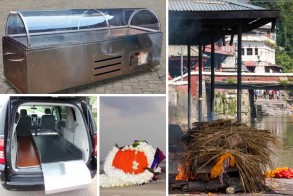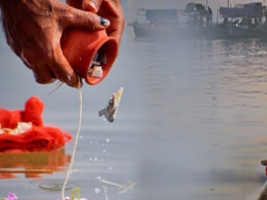Lastjourney Blog
Why Should We Take A Bath After Attending A Funeral & Cremation?

 Table of Contents
Table of Contents- Cultural Beliefs on Taking a Bath after Attending Funeral or Cremation
- What scientific beliefs are behind bathing after attending a funeral and cremation rite?
- What are some popular myths and facts regarding " Taking Bath After Attending Funeral or Cremation"
Many of us have wondered why it is necessary to take a bath after attending a funeral or cremation. Certain rituals are offered to the deceased person in each religion, culture, customs, and subsect. These include funerals, cremations, burials, and many other offerings determined to bring peace, comfort, and dignity to the departed soul.
But after the completion of rituals, close family members of the deceased must adhere to some more religious aspects. "Taking a ceremonial bath after offering or attending the funeral and cremation of the deceased" is one such cultural belief that Hindus and Muslims widely embrace.
Here, we will apprise ourselves of the strengthening causes, myths, and facts about the acceptance of "mandatory ceremonial bathing" after funeral and cremation rites.
Cultural Beliefs on Taking a Bath after Attending Funeral or Cremation
Though unpleasing occasions like funerals and cremation are considered sorrowful gatherings, it is essential to attend them.
According to the sacred scriptures of Hinduism, the place where funerals and cremations are performed holds abundant negative energies. Even the deceased body of your family member becomes impure.
- Taking a ceremonial bath is mandatory for all people who performed or attended the funeral and cremation ritual to shrug off evil eyes or any bad energies from their bodies.
- In Hindu culture, it is believed that a person must wash the clothes worn at a funeral and cremation after returning from those places and must rinse themselves from head to toe.
- These days, many people sprinkle a few drops of water on themselves and chant a purifying verse. But ideally, it is not right to lessen the chances of ill effects on the human body using the crematorium's energies.
Apart from visiting a funeral and cremation place to attend the last rites of the deceased, visiting the deceased's home and touching the "Sutakas" ( close family members of the deceased) should also be followed by ceremonial bathing. The close family members of the deceased person also remain impure till 13 days after the demise of a family member.
In Islamic culture, taking a bath is also essential after touching a cold or dead body. This ceremonial bath is recognized as "hustle Janab."
Read also: What Is The Reason Why Son Law Does to The Funeral?
What scientific beliefs are behind bathing after attending a funeral and cremation rite?
It is widely accepted that the faiths and beliefs followed in Hindu culture are determined by a compelling scientific reason. Ceremonial bathing after funerals and cremations is no exception. Look at the points that act similarly like a strong scientific cause behind this notion.
- Bathing is related to the basic practice adopted for cleanliness and sanitation. Usually, the place where funerals and cremation are hosted becomes the hub of infecting elements due to the presence of several people. Hence, bathing holds the potential to remove all those infecting elements.
- Another reason is that when a soul leaves the human body, it loses all the potential to fight decomposing factors and bacteria. When the body becomes incapable of fighting these ill elements, they starts dislocating their positions from the deceased body to the attendees present there. Therefore, bathing becomes crucial to eliminating the chance of spreading communicable diseases.
- Apart from preventing the human body from falling prey to disease factors, the ceremonial bath enables the grievers to put their lives back on track of routine life. Tubath can calm or soothe the aching heart as well as console the distressed mental state of a mourner. In Hindu culture, the cremation places are usually located near a sacred riverbank or any other designated waterbodyScavengers visit this site frequently to consume the leftover parts of the deceased body. This is another reason why mandatory bathing after attending the cremation rituals is required, l as these scavengers are considered major factors in spreading rapidly growing bacteria and other infecting elements.
- In ancient times, there were no vaccines for diseases like Hepatitis, smallpox, or other infections. Hence, our ancestors made "things" mandatory after returning from the funeral and cremation location.
What are some popular myths and facts regarding " Taking Bath After Attending Funeral or Cremation"
Several myths are also concealed in the form of religious belief behind the practice of "ceremonial bathing" after participating in a funeral and cremation.
Myth - Taking a bath after attending the funeral ward off the bad luck.
Fa—There is no proven way to ensure that a funeral attendee will not encounter any bad luck after visiting the place of funeral and cremation. But taking a ceremonial bath maintains good hygiene and reduces the chances of falling ill due to contagious disease factors.
My: - Taking a bath after attending a funeral or cremation protects you from the negative impact of evil factors.
Fact - Taking a shower or bath after visiting places like a funeral hall and cremation (Shamshan Ghat) absorbs all the negativity infused in the mind & body of the attendee.
It also helps people return to their normal lives. Therefore, the attendees of the funeral and cremation feel light and better after bathing.
Conclusion -
A ceremonial bath cleans up the entire aura of the person who visited a deceased person's funeral and cremation ceremony. It not only purifies the person's physical existence but also ensures relief from distressing situations.
Is it essential to take a bath after returning from the funeral hall or a cremation place?
Which reasons fortify the notion of the ceremonial bath after attending a funeral and cremation?
Your email address will not be published. Required fields are marked *












